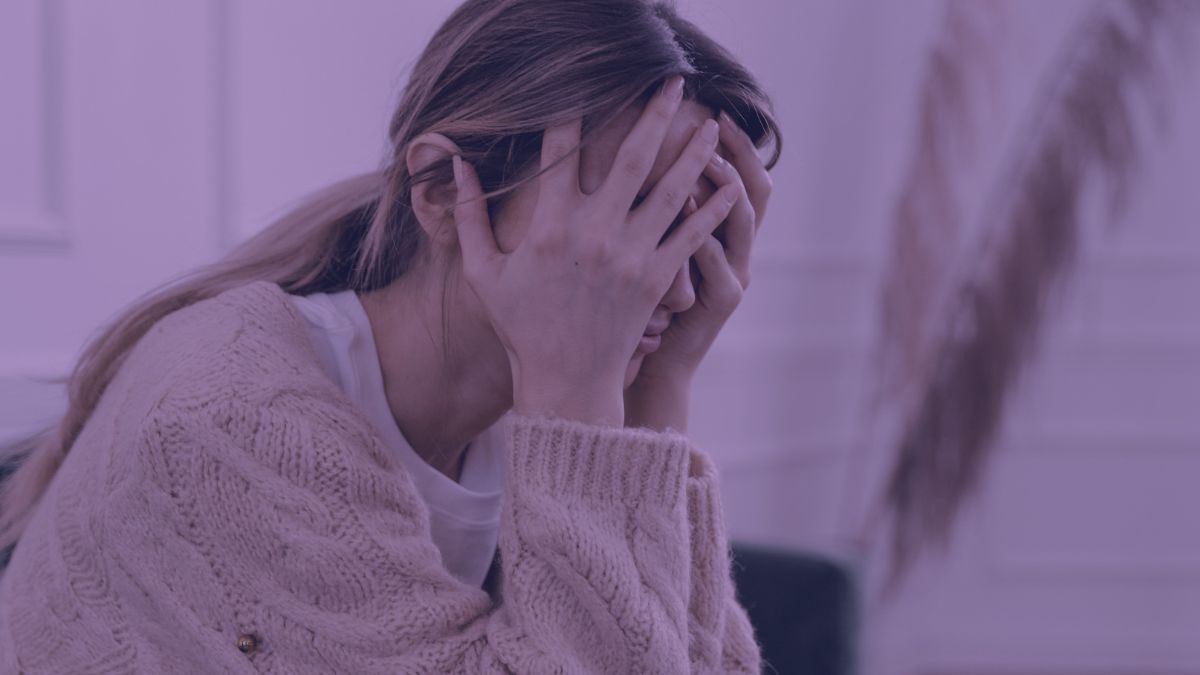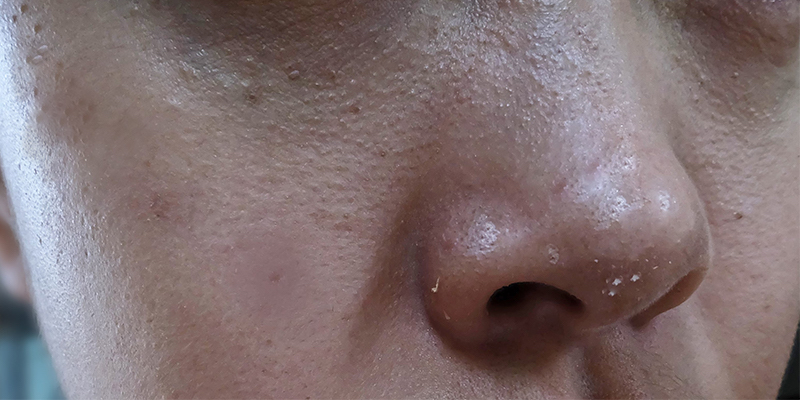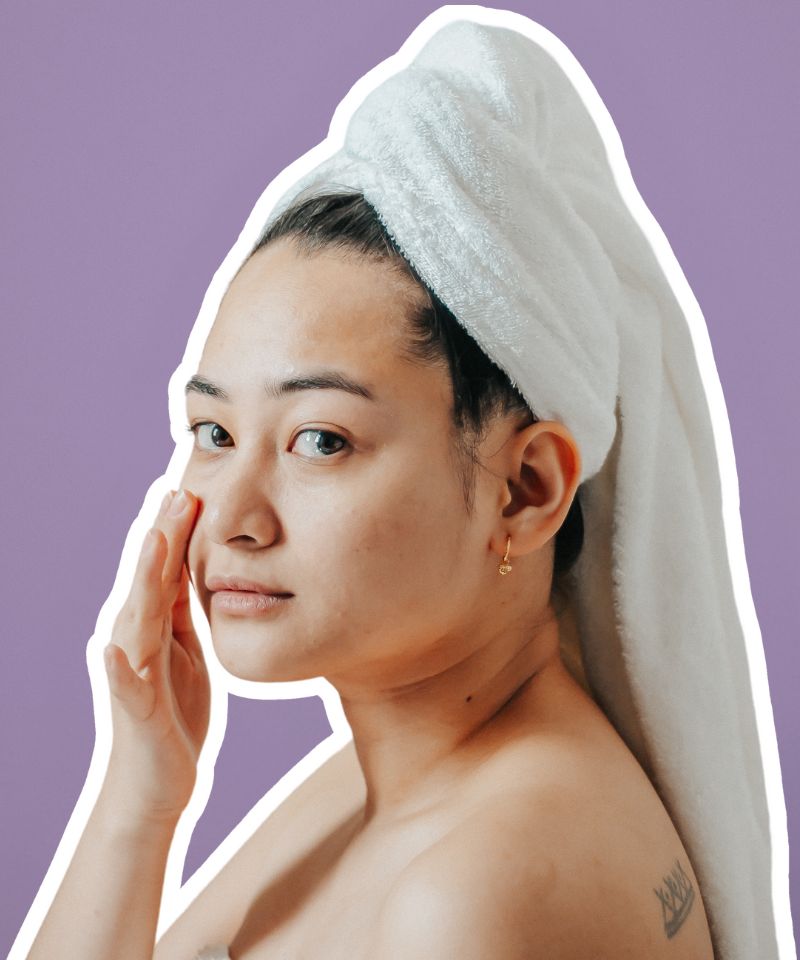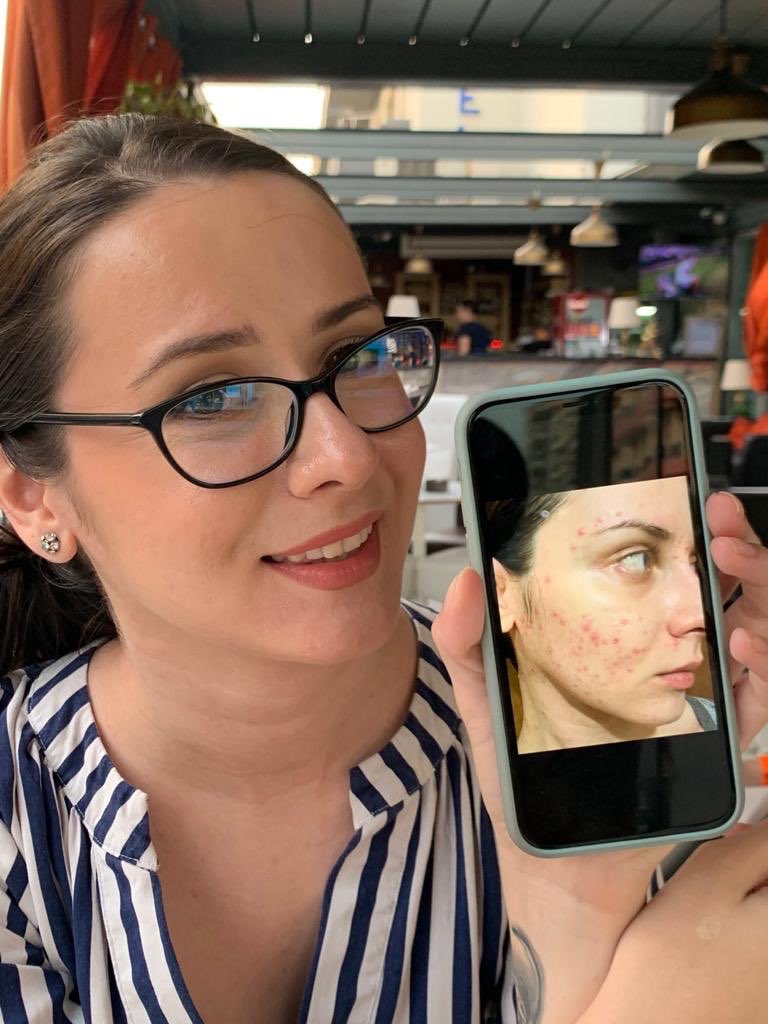If the challenges of modern life are taking their toll on your mind and skin, you are definitely not alone.
Have you ever noticed that your complexion seems to be stressing out right along with you, resulting in more pimples or even more serious cysts?
Well, it is definitely not your imagination…
Yes, stress can cause acne by causing a spike in hormones that stimulate the sebaceous glands to overproduce pore-clogging sebum.
In this article, I will delve into the details of how stress causes acne, how to recognize stress-induced breakouts, and, of course, how to get rid of this inflammatory condition through healthy changes in your lifestyle habits and skincare routine.

Why Do Acne Breakouts Happen?
Acne breakouts occur when pores get clogged with excess oil and dead skin cells.
Our pores are an opening to a follicle made up of a single hair and sebaceous glands.
The sebaceous glands release an oily substance known as sebum, which travels up and out of the pore and on the skin’s surface to keep our skin moisturized and lubricated.
Moreover, sebum protects the skin from pollution, dirt, and environmental aggressors with its mild bactericidal properties that prevent the overgrowth of some types of bacteria.
As we already mentioned above, acne develops when the pores on your skin become clogged with excess sebum and a mixture of accumulated dead skin cells, which is essentially food for bacteria that, once fed, start to overgrow inside the pore.

The mixture and bacterial overgrowth then trigger your immune system to fight against it, which results in a swollen, red spot, often filled with pus we know as a pimple.
Can Stress Cause Acne?
Yes, stress can indeed cause acne.
While stress itself doesn’t directly create acne, it exacerbates the condition by influencing hormonal levels in the body.
Stress triggers the release of cortisol, a hormone that can increase oil production in the skin’s sebaceous glands.
This excess oil can clog pores, leading to acne outbreaks.
Moreover, stress can weaken the immune system, reducing the skin’s ability to fight off acne-causing bacteria, thereby increasing the severity and duration of acne flare-ups.
Finally, stress can actively interfere with your daily routine, as you are more likely to skip your skincare regimen after a long, exhausting, and stressful day.
This may result in sleeping in makeup or the accumulation of impurities on the skin’s surface, which can clog the pores and exacerbate acne.
While you may end up needing to take several approaches to clear your skin, reducing your stress levels may end up being an important enough reason for you to prevent more serious health problems.
What Does Stress-Induced Acne Look Like?
Stress-induced acne typically appears as a sudden flare-up of pimples, which can range from small, surface-level comedones (whiteheads and blackheads) to deep cystic acne, and it often occurs on the face, neck, chest, and back.
These breakouts are usually more inflamed and persistent, coinciding with periods of high stress or emotional turmoil.
Unlike hormonal acne that might follow a predictable pattern (such as along the jawline), stress-induced acne can be more widespread and erratic in its distribution.
Additionally, stress-induced acne may also appear in areas where you tend to touch your face more during times of stress, such as your temples or chin, due to the transfer of oils and bacteria from your hands.
This behavior can exacerbate acne by clogging pores and introducing additional bacteria to the skin, leading to increased inflammation and breakouts.
Moreover, stress can disrupt the skin’s barrier function, making it more susceptible to irritation and infection.
During prolonged periods of high stress, the skin may also appear oilier than usual, which might be accompanied by other stress-related skin issues like eczema or rosacea, further complicating the condition.
As a result, inflammatory skin conditions under stress may not only be more prevalent but can also be more challenging to heal, often leading to a cycle of irritation and outbreaks.
Skincare Tips for Stress-Related Acne

Adopting a skincare routine that reduces inflammation is crucial for effectively addressing stress-induced acne and preventing future breakouts.
Below, we’ll break down each step of a recommended skincare routine, highlighting key ingredients to look for that are beneficial for managing stress-induced acne.
Gentle Cleansing
Excessive dirt buildup on the surface of your skin can very well cause blockages of the follicle, trapping sebum, dead skin cells, and bacteria inside the pores.
Proper skin cleansing clears your pores of debris to prevent a buildup of dirt and allow the natural oil to reach the skin surface unimpeded.
This will significantly decrease your chances of experiencing acne breakouts, especially during times of high stress.
Ingredients to look for:
- Hyaluronic Acid: Helps the skin retain moisture and keeps it hydrated without adding oil.
- Ceramides: Support the skin barrier, ensuring the skin remains resilient against irritants.
Best cleanser for stress-induced acne: La Roche-Posay – Toleriane Purifying Foaming Cleanser.
Exfoliation
Incorporating a mild chemical exfoliant can prevent pore clogging and promote skin renewal.
Exfoliating toners or serums containing ingredients such as AHAs and BHAs can help dissolve the accumulation of dead skin cells on the skin’s surface and inside the pores, preventing the overgrowth of bacteria and breakouts later on.
Ingredients to look for:
- Salicylic Acid: Beta-hydroxy acid (BHA) that deeply penetrates pores to dissolve excess oil and dead skin cells.
- Mandelic Acid: Alpha-hydroxy acid (AHA) that exfoliates the skin’s surface, promoting a smoother, clearer complexion.
Best exfoliator for stress-induced acne: Vivant Skin Care – 8% Mandelic Acid Serum.
Moisturizing
Using a lightweight moisturizer will help reduce acne by providing the necessary moisture that will slow down the overactivity of the sebaceous glands.
Remember that when you are stressed, your skin is more likely to lose moisture, which increases its need for hydration.
This reaction will trigger the sebaceous glands to overproduce oil to compensate for the dryness.
However, the excess oil may only end up clogging pores and leading to more breakouts.
Therefore, using a moisturizer will sufficiently hydrate your skin, leading to balanced oil production and decreased potential for clogged pores and breakouts later on.
Ingredients to look for:
- Glycerin: A humectant that attracts water to the skin, providing hydration without contributing to oiliness.
- Niacinamide: Reduces inflammation, refines enlarged pores, and regulates oil production.
Best moisturizer for stress-induced acne: Paula’s Choice – RESIST Anti-Aging Clear Skin Hydrator.
Acne Treatments
Besides exfoliation, incorporating targeted acne treatments into your skincare regimen can help reduce breakouts and prevent new pimples from forming.
Ingredients to look for:
- Benzoyl Peroxide: Destroys the overgrowth of the acne-causing bacteria and helps clear clogged pores.
- Retinoids: Promote cell turnover, helping to prevent dead skin cells from becoming stuck inside the pores and leading to the formation of acne lesions.
Best acne treatment for stress-induced acne: Vivant Skin Care – Derm-A-Gel.
Sun Protection
Daily sunscreen is a must to protect the skin from harmful UV rays, which can exacerbate acne scars.
Ingredients to look for:
- Zinc Oxide: Provides broad-spectrum protection while also soothing inflammation and strengthening the skin barrier.
- Titanium Dioxide: Another effective sun protectant that won’t clog your pores or further irritate already inflamed skin.
Best sunscreen for stress-induced acne: EltaMD – UV Physical Broad-Spectrum SPF 41.
Spot Treatment
A spot treatment can be another effective option for targeted action against stubborn but sparse blemishes.
Ingredients to look for:
Sulfur: Helps dry out the surface of the skin to absorb excess oil and unclog pores.
Tea Tree Oil: Known for its antimicrobial and anti-inflammatory properties, helping to reduce the severity of pimples.
Best spot treatment for stress-induced acne: Naturium – Sulfur Spot Treatment 8%.
Also, Consider the Following Lifestyle Changes to Reduce Stress:
Reducing stress can significantly impact your skin health.
Consider incorporating these lifestyle habits:
Regular Exercise:
Engage in at least 30 minutes of moderate exercise most days of the week.
Activities like brisk walking, cycling, or yoga can boost your dopamine levels, which will, in turn, reduce stress and improve your skin health.
Adequate Sleep:
Aim for 7-9 hours of quality sleep per night.
Establish a relaxing bedtime routine and maintain a consistent sleep schedule to improve sleep quality and reduce stress.
Diet:
Eat a balanced diet rich in fruits, vegetables, lean proteins, and whole grains.
Foods high in antioxidants can combat stress-related oxidative stress, and omega-3 fatty acids found in fish like salmon can help reduce inflammation.
Supplements:
Certain supplements such as magnesium and omega-3 may also help improve sleep, reduce stress, and lower inflammation, which will help reduce the appearance of acne and other inflammatory skin conditions exacerbated by stress.
Mindfulness and Relaxation Techniques:
Practice mindfulness, meditation, deep breathing exercises, or progressive muscle relaxation to manage stress levels effectively and lower their inflammatory effect on your body.
Time Management:
Prioritize tasks and set realistic deadlines to avoid overcommitment and stress.
Learning to say no and practicing healthy social and professional boundaries is crucial in managing your stress levels.
Struggling with breakouts due to stress?

Dive into “The Acne Solution,” where we tackle more than just symptoms.
My brand-new acne course is your blueprint to understanding and overcoming acne by addressing its root causes, including stress.
Get ready to transform your skin and your life with expert insights, proven strategies, and a holistic approach.
Say goodbye to endless trials and welcome clear, vibrant skin.
Join “The Acne Solution” today – because your skin’s revival starts now.

My name is Simone and I am a certified skin specialist. I created this website to teach my readers how to take great care of their skin and I also like to occasionally share my honest opinions on skincare products I’ve tried. You can learn more about me here.
